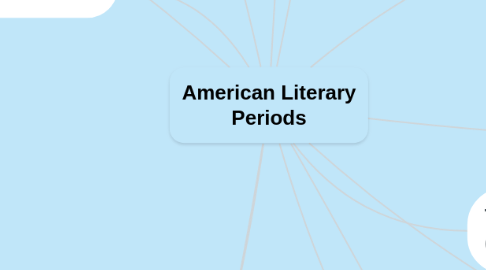
1. It started after World War ll until the day. Television and radio mantained society from all around the world "up to date". Inmigration to USA was massive. 20% of the immigrants were woman. Woman believe they can work the same as man, Feminism started. Inmigration provoked fear and racism, Americans were in disagreement with people from the outside deciding for them in political choices. Marthin Luther King hold "I have a dream". Facebook was realised, and this led to the freely expressions of the society as never before. Technology and Science developed massively
1.1. Genre
1.1.1. It was an extensive list of genres
1.2. Authors
1.2.1. JD Salinger, Stephen King, Joyce Carol Oasters.
2. Age of Reason (1750-1800)
3. Realism (1850-1900)
3.1. Left imagery BEHIND. It often tells readers about daily life. Corruption, poverty and divisions between the economic clases were often the ideas expressed through art. Paintings were about the daily life, prostitution, and loneliness. Painters forced others to see the reality of their sorrounding.
3.1.1. Authors
3.1.1.1. Theodore Dreiser, Henry James, William Dean Howells, Edit Warthon, Mary Wilkins Freeman.
4. Naturalism (1865-1915)
4.1. Subgenre of realism. NOT about nature. It was believe that people are governed by natural or innate laws. In addition, were forces dealing with places were we grow up. Behavioral Psychology started rise. Writtens were dramatic. Characters in novels were governed by their passions or instincts. Novels often mention "man against nature", "man against himself", especially "man as animals". There was the belief of God, but not a helpful God.
4.1.1. Universal Themes
4.1.1.1. Man vs Man
4.1.1.2. Man vs Nature
4.1.1.3. Man vs Society
4.1.1.4. Man vs Himself
4.1.1.5. Man vs Machine
4.1.2. Theodore Draiser
4.1.3. Authors
4.1.3.1. Stephe Crane
4.1.3.2. Jack London
4.1.3.3. Frank Norris
4.1.4. Genre
5. Regionalism (1865-1915)
5.1. Part of realism movement. It is also named "Local Color". It often refers to people in sociological circunstances. It was try to preserve a a distinctive way of life in the past. It is said that "nothing" happens in Local Color stories, eventhough this type of stories contribute to the reunification after the Civil War in American. It focused in the different aspects from a particular region. Time and place can become a character in this type of stories. Feminism movement through writtens stories. It is influenced by realism and romanticism. Regionalist stories are more aware of the time and place where the story happens than in other details.
5.1.1. Genre
5.1.1.1. Sketch, Shor stories
5.1.2. Authors
5.1.2.1. Kate Chopin, Willa Cather, William Faulkner, Kate Chopin, Frank Norris, Sarah Orne Jewett.
6. Contemporary (1950-Present)
7. References: Nur E.2016, The Contemporary Period, retrieved from: https://www.youtube.com/watch?v=y7JDvKneN_k Flores I. 2013, The Romantic Period in American Literature and Art, retrieved from: https://www.youtube.com/watch?v=okPFcJntqFA NBC New learn, 2020, Realism in Art and Literature in the 19th Century, retrieved from: https://www.youtube.com/watch?v=_GPEE8PdSS0 MacRobbie L. 2016, Age of Reason Literature Background, retrieved from: https://www.youtube.com/watch?v=fTOnDOkqp3o Flocabulary, 2017, The History of Colonial Period, retrieved from: https://www.youtube.com/watch?v=Do4Ryapg3eU Bacons M, 2012, American Literature Periods - Transcendentalism, retrieved from: https://www.youtube.com/watch?v=H6UvQ4x9T6Q Morris K, 2018, Anti-transcendentalism, retrieved from: https://www.youtube.com/watch?v=T2w0S80NQXw MacRobbie L, 2016, Naturalism in Literature, retrieved from: https://www.youtube.com/watch?v=-E_lkPIBTKU Benson A, 2016, Regionalism, retrieved from: https://www.youtube.com/watch?v=C_maSZ1zTqg
8. Also called the enlightenment, rejected all the beliefs of puritans, especially superstitions. Through reason and science, they believed humans can become better. The end of ignorance. They were focus to make human free. They kept some aspect fromm puritans, as the idea from Ben Franklin about self-improvement through schools and education. The declaration of independence was written.
8.1. Genres
8.1.1. Sermons (See Johnatan Edwards), diaries, personal narratives.
8.2. Authors
8.2.1. Abigail Adams, Benjamin Franklin, Thomas Jefferson, Thomas Paine.
8.3. Genres
8.3.1. Essays, pamphlets, travel writings, speeches, and documents.
9. Short stories, poems, novels.
10. Derived from romanticism. Each person is God as part of a whole. They believe in life after death. NOT a religion. Transcendentalist were very optimistic. For transcendentalist there is all connected with the soul. As romantics, they believe there is something supernatural beyond. Anti-transcendentalism was the opposite. Anti-trascendentalists were against transcendentalism.
10.1. Authors of Transcendentalism
10.1.1. Ralph Waldo Emerson, Walt Whitman, Henry David Torean, Sarah Margaret Fuller
10.2. Authors of Anti-Transcendentalism
10.2.1. Nathaniel Hawthorne, Herman Melville
10.3. Genres
11. The Colonial Period (1620-1750)
11.1. by the 17s, 13 colonies were set up in the lands of America. Those colonies were divided into three bigger groups named The Northern, Middle and Southern.
11.1.1. The Northern Colonies
11.1.1.1. New Hamsphere, Maine, Connecticut, Massachusetts, Rode Islands.
11.1.1.1.1. They were focus on purify the men. Fishing for economy. Steamboats for trade. No slavery but racism.
11.1.2. The Middle Colonies
11.1.2.1. New York, New Jersey, Pensilvannia, Melaware.
11.1.2.1.1. Slavery was not legal but practiced. Platations for economy. Factories.
11.1.3. The Southern Colonies
11.1.3.1. Virginia, Maryland, North Carolina, South Carolina, Georgia.
11.1.3.1.1. Cotton, Rice, and Tobacco as main source of economy. Slavery was legal
12. Romanticism (1800-1860)
12.1. Emotions became extremelly important. Romanticism is not especifically about romantic stories as a woman and man falling in love. The Romantics try to recover the religious belief from puritans, but with nature. Connection or recycled stories were made from the past to this time. Individuality as source for intuition. Ghotic Romanticism.
12.1.1. Authors
12.1.1.1. Washington Irving, Edgar Allan Poe, Herman Melville, Nathaniel Hawthorne.
12.1.2. Genres
